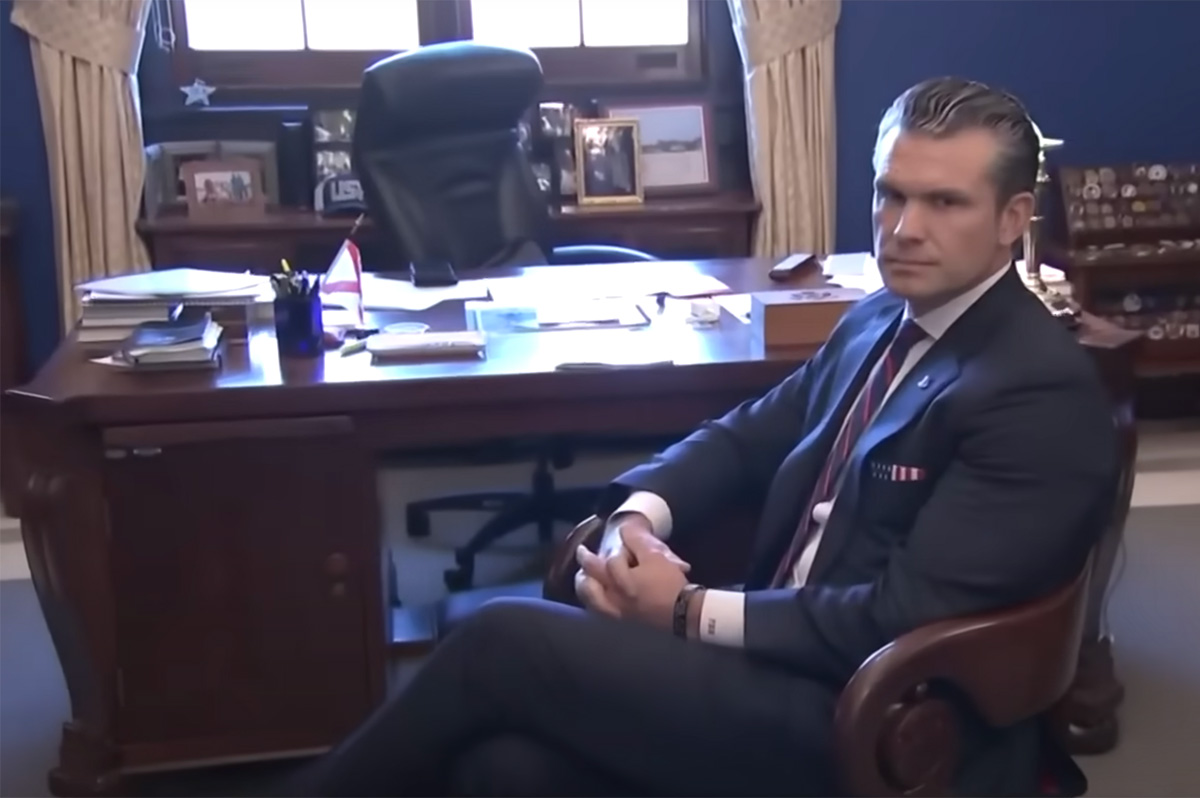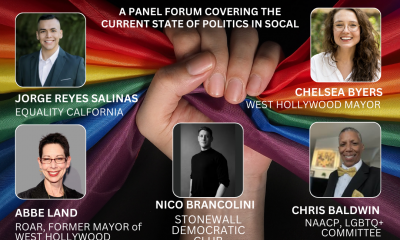Opinions
Will any GOP senators oppose Trump’s unqualified nominees?
Serious questions loom as confirmation hearings set to begin

As we move toward Jan. 20, when Donald Trump and his acolytes complete their takeover of the government, we really have no idea what will happen. Trump and his co-president, Elon Musk, lie with impunity. It’s hard to tell if they believe their own lies.
For Trump, a decision is often based on who whispered in his ear last. He is easily riled, and when it comes to Musk, it was fun to see him feel he had to respond when Rosa DeLauro (D-Conn.) called Musk, President Musk. In a Phoenix rally Trump felt obliged to explain Musk couldn’t be president as he wasn’t born here. We know Trump is losing it, often mixing up where he is, names, and dates. Will the media report on that the way they did with Biden? It is getting more apparent the media is being cowed by Trump. Recently the New York Times reported, “Ann Telnaes, a Pulitzer Prize-winning cartoonist for The Washington Post, said on Friday evening that she was resigning after the newspaper’s opinions section rejected a cartoon depicting The Post’s owner, Jeff Bezos, (and other media moguls) genuflecting toward a statue of President-elect Donald J. Trump.”
The first test of how the Republican Senate will respond to Trump will begin shortly as they start the hearings on his Cabinet nominees. We will soon know if even the few rational Republican senators left keep their lips firmly glued to Trump’s ass, or will at least four of them find their balls? While most of Trump’s nominees will sail through, no matter how bad they are, there are a few we need to watch closely. Those are Pete Hegseth for Defense Secretary; Kash Patel for FBI Director; RFK Jr. for Secretary of Health and Human Services; and Tulsi Gabbard, for Director of National Intelligence. These nominations are an abomination and dangerous.
Hegseth’s hearings will be conducted by the Armed Services Committee with Chairman Roger Wicker, (R-Miss), and Jack Reed (D-R.I.), ranking member. Robert F. Kennedy Jr. will first need to get through the Senate Finance Committee; Michael Crapo (R-Idaho) chair, and Ron Wyden (D-Ore.), ranking member. Patel will go to the Senate Judiciary Committee with Chuck Grassley (R-Iowa) as chair, and Dick Durbin (D-Ill.), as ranking member. Tulsi Gabbard will go to the Senate Intelligence Committee with Tom Cotton (R-Arkansas) as chair, and Mark Warner (D-Va.), as ranking member.
I am not holding my breath that any Republicans will ask the tough questions. But we can hope Democrats will. It will be interesting to see what they focus on. Will they ask RFK Jr. the important questions on children’s vaccines? We know he opposes them but will he take away the mandate for insurance to pay for them? Will he try to get school systems to abandon their requirement that children be vaccinated before coming to school? Will he oppose continuing to have NIH do the research to develop a vaccine to prevent HIV/AIDS? What will he do about the polio vaccine and ensuring it is paid for all children? Will he recommend we withdraw from the World Health Organization?
Then will they ask Gabbard about her meeting with deposed Syrian dictator Assad, her relations with Vladimir Putin, and the war in Ukraine? How she would handle classified documents and what did she think about how Trump handled them? What are the changes she wants to make in the agencies reporting to the Director of National Intelligence? Does she even know what each of them does? How does her background qualify her for this important and sensitive job?
Then there is Hegseth. What will they ask him? What does he see as his qualifications for the job? Does he understand what the job is, and his relationship to the Joint Chiefs of Staff? What are Patel’s qualifications to lead the FBI? Will he go after an enemies list based on all his previous statements?
I would assume Democrats on the committees will be prepped with a long list of questions to ask each nominee, and will work together to try to make the American people understand how each is totally unqualified to head the agency they are being nominated to lead. Then we will have to look at how the media report on all these hearings.
One of the things the American people need to understand is whether or not they believe in Trump’s version of ‘America First,’ each of these nominees will impact how we deal with the world, and whether we are ever trusted again.
Peter Rosenstein is a longtime LGBTQ rights and Democratic Party activist.
Opinions
Gay for pay: Andy Lee and the changing face of content creation
Are the lines between identity and performance more fluid than we’re ready to admit?

In today’s ever-fapping world, the intersection of sexual identity and content creation has become more complicated than ever. Irish content creator Andy Lee, cozily ranking in the top 0% of OnlyFans creators, with his furry physique and tatted up torso, is at the center of the conversation. A self-identifying hetero who rose to prominence during the Pandemic, Lee has amassed a girthy following of horny gays, likely because of the exclusive man-on-man content he has to offer. Yet, his success raises just as many eyebrows as it does trousers. Many question the authenticity of his content, sexual identity and whether or not straight men are overshadowing their openly gay peers.
Claiming to be straight only to then go pole-to-pole on camera, Lee is seen by a significant portion of the queer community to be guilty of queerbaiting (exploiting gay culture for profit). Others can’t help but wonder, is this slab of man-meat genuinely drawn to the physical (and perhaps emotional) experiences he has with men, despite identifying as a thorough(ly) bred breeder?
Lee’s OnlyFans career showcases the blurred, often contradictory nature of sexual identity. He enjoys sexual experiences with men but still identifies as straight, which challenges traditional labels like “gay” and “straight.” His content forces us to confront the nuanced lines of sexual identity, which are rarely ever clear-cut and often defy simple categorization.
The question of authenticity also hangs in the amyl nitrite-scented air. While Lee has said his career on OnlyFans has made him feel “wanted and loved” (and paid) by the gay community, many argue that his identity as a straight man undermines the emotional connection his audience thirsts for. Is his content less authentic due to its “no-homo” viewer discretion warning, or does his openness to explore other men’s bodies reflect the evolving, fluid nature of human sexuality?
This has led to several openly gay performers to claim that, well, “they’re taking our jobs.” They argue that by creating gay content for profit, straight men commodify gay experiences while avoiding the brunt of the stigma that accompanies being openly gay. But how valid is this criticism? In a consumer-driven adult content market, if people choose to engage with Lee’s content, are they unintentionally depriving the gay sex-working community?
And then there is the aspect of the gay gaze (did not stutter). Is it the allure of the forbidden nature of straight men giving into the carnal pleasures that another man has to offer? The taboo? The challenge? Or are they simply the proxy of the coach you had a crush on in high school, the hot trainer who you overheard has a girlfriend, or that college professor you once stood next to at the urinals only to find out for yourself just how extensive his curriculum was? For many, this particular brand of tension is a huge part of the turn-on.
This paradox is just one part of a broader cultural conversation about masculinity and sexual identity. Straight men in gay content can subvert traditional gender roles, while simultaneously reinforcing certain ideals of masculinity. In cases like Lee’s, when a straight man openly enjoys the physical pleasure of being with other men, it speaks to both the complexity and fluidity of sexual identity, and the inability of inflexible labels to accurately and respectfully encompass human desire.
Ultimately, the conversation around gay-for-pay creators like Andy Lee isn’t black and white, straight or gay. Although likely unintentional (let’s be real), these performers challenge existing ideas of identity, authenticity, and the commodification of desire. Whether Lee is queerbaiting, exploring his own sexuality, or just making stacks of cash, his presence in the adult content world invites folks to rethink how we define sexual identity today. Just something to think about next time you’re… enjoying content.
AJ Sloan is a writer, retired adult performer and clinical counseling graduate student. His work has been featured in Huffington Post and The Advocate and led his own weekly column for Fleshbot.
Opinions
Why is it important for cities to become LGBTQ sanctuary cities?
This is not just a win, it is a small, but monumental stride toward progress, representation and protection

When a city passes the motion to make their city an LGBTQ sanctuary city, it means that city or state resources cannot be used to prosecute or punish LGBTQ people for seeking gender-affirming care, resources or government assistance.
As many of us know, there are three major levels of government: local, state and federal.
City motions set a precedent for the state, adding local representation on a small scale that hypothetically catches on and makes its way up the ladder to the state, then federal level.
Though the Trump administration holds a lot of power on a federal level, states, cities and municipalities hold power on a level that is easier for local communities to change and control. If cities across the state begin passing motions to become LGBTQ sanctuary cities, the state then has to consider passing the motion to become a sanctuary state. If the majority of states consider themselves sanctuary states, it pushes the change on a national, or federal, level.
At first glance, it seems like the move for a city to consider itself an LGBTQ sanctuary city is not a big deal because there is no financial flow in the motion and there are no special funds to be allocated. The only visible change is the new title the city gets to claim. However, passing motions in favor of LGBTQ rights, is crucial toward the longer and harder journey to attain rights on a national level. It is a far more nuanced issue than what it seems.
If that same logic were to hold up when it comes to statewide decisions, then it could become easy to dismantle progress made on any level.
The Advocate published an article in November when the City of Los Angeles unanimously passed the ordinance to become an LGBTQ sanctuary city. Passing the ordinance means that the city is now responsible for “shielding queer youth who travel to the city to receive gender-affirming care from prosecution, as well as preventing city resources from being used in immigration enforcement or assisting federal immigration officials.”
During the November 2024 election, Proposition 3 made it on the ballot and Californians had the choice of voting in favor or against the proposition that would only change the outdated language of the California state constitution, that until recently did not recognize same-sex or interracial marriages. To some, the change seemed meaningless, but on a statewide level, passing this proposition meant cementing the progress made on the protection of same-sex and interracial marriages. Though the proposition had no money flow in the matter, this important move signaled the support of the state in favor of LGBTQ rights on a state level.
While California is already a sanctuary state, it is also crucial to recognize protections and rights in individual cities. During these unprecedented and uncertain times in LGBTQ history, it is more crucial than ever to push for these changes.
When one city makes the move to become a sanctuary city, others follow and LGBTQ representation becomes more visible on a government level.
In November, shortly after Trump was elected as the 47th president of the United States, Los Angeles declared itself an LGBTQ sanctuary city.
Now, Long Beach has followed suit and has unanimously approved a resolution to make the city a transgender sanctuary city and officially recognize March 31 as Trans Day of Visibility.
There are a growing number of LGBTQ sanctuary cities across the nation. In California, the list of cities includes San Francisco, Sacramento, West Hollywood, Los Angeles and most recently, Long Beach.
Other cities, including Boston, Massachusetts; Olympia, Washington; Cambridge, Massachusetts and others across the nation have also recently declared their status in support of LGBTQ people.
This is not just a win – it is a small, but monumental stride toward progress, representation and protection. We need more cities to push motions to become sanctuaries for queer and transgender people as the current administration continues to use queer and trans people as political pawns in the chess game rigged for the alt-right.
Miscellaneous
Gay bar in California bans MAGA gear — but no other political expression — from its premises
MAGA is a terrorist threat to the LGBTQIA+ community

Do not let anyone bait you into a “both sides” argument on this topic. Trans people can confirm that we no longer live in a country where freedom of expression exists in the first place, so the point in and of itself is moot. Don’t waste your energy.
But especially don’t be shamed by those who imagine themselves to be more enlightened than you as they make the tired false equivalence that MAGA is just another political ideology that deserves the same freedom of expression as liberal points of view.
The owners of the Badlands Bar are keeping their patrons safe from terrorism. Yes, MAGA is a terrorist threat to the LGBTQ community. Oxford’s definition of terrorism is “the unlawful use of violence and intimidation, especially against civilians, in the pursuit of political aims.”
It’s too long a list for this article, so here’s a link to a running tally of the government’s actions against the LGBTQ community since Jan. 20.
It started, on Trump’s first day as president, with trans people being forcibly stripped of their very identity — and with it, all protections — under the law. This trend has continued, ominous drip after ominous drip of frequently illegal Executive Orders that dehumanize, disenfranchise and dismantle the basic rights and dignities of trans and queer Americans. If you’re following the Project 2025 playbook, as the federal government is, you’ll notice that ending marriage equality is quickly coming up on MAGAs To Do list.
All of that—the bullying, the emotional and psychological abuse, the stripping of rights, the (eventual, inevitable) tearing apart of families—is violence, by definition. The anxiety you feel every day as an LGBTQ American? That’s intimidation. And that is why living under MAGA as an LGBTQ person means living in a terrorist state.
Perhaps the idea that MAGA perpetrates outright terrorism seems dramatic, especially for those who remember 9/11 and maybe we don’t need to add more drama to this historical moment.
Then let’s consider the terrorism of words and ideas.
Stochastic terrorism, is a particularly nasty form of political expression, where those with cultural power spout hostile rhetoric about a group, creating a culture of hate that inevitably — but not directly — results in violence. When we talk about haters becoming emboldened by Trump’s rhetoric, this is the dangerous potential that absolutely does become reality.
The insidious part of stochastic terrorism is that there’s plausible deniability on the part of the instigators. Truly, who do we blame for the murder of Lauri Carleton in Lake Arrowhead, CA?
Do we blame the individual who shot her after he screamed epithets about the Pride flag she flew in front of her store? Or do we blame the talking heads and podcast hosts who were then spending untold airtime equating LGBTQ people with pedophilia and grooming? Or do we blame the governors who sought to ban the flying of Pride flags in public, for turning them — and all of us who fly them — into high-profile lightning rods for hate? Who should be charged in a court of law for this hateful crime?
If any comparison to terrorism still seems too far-fetched to you, even for MAGA, then let’s consider the term “gang.”
Flip all the racist rhetoric you’ve passively absorbed about the kinds of people most likely to be in a gang, and consider Donald Trump, the current Republican Party, and MAGAs specifically as you read the following definitions of what a gang is.
According to the Department of Justice:
- Gangs adopt a group identity in order to create an atmosphere of fear or intimidation.
- Gangs are typically organized upon racial, ethnic, or political lines and employ common names, slogans, symbols, hand signs, or style of clothing.
- The gang’s primary purpose is to engage in the use of violence or intimidation to enhance or preserve its power, reputation, or economic resources.
If we hold MAGA to the DOJ’s gang standards it so easily fits into, perhaps we can more easily hold that most businesses explicitly bar gang symbols from their premises, often as an easily-enforcible safety measure, and consider the Badlands Bar owners’ actions in that context.
But if you’re still suspicious of any of this rhetoric, then all that’s left is to consider the reality of MAGAs actions, which owners of LGBTQ bars around the country experience on a regular basis.
On Feb. 22 at Scorpio, in Charlotte, NC: an exception made to a “no political affiliations of any kind” dress code, devolved into the individual making transphobic remarks at the entertainers during the drag show. He refused to leave when asked and became aggressive toward security, resulting in police intervention.
On March 14 at the Chatterbox Jazz Lounge in Indiana, MAGA hat-wearing patrons aggressively misgendered and harassed a bartender and were ejected. The video of the altercation went viral; the owner reports his bar has since received several threats of arson and bodily harm.
Four days after the video of that incident went viral, the Chatterbox Tavern in Tennessee received threatening emails and phone calls.
These incidents were flashpoints that reported, often by MAGAs claiming victimhood. Untold incidents go unreported due to intimidation or uninvestigated due to bias. According to GLAAD’s 2022-24 ALERT Desk Report, over 1,850 anti-LGBTQ incidents were reported across all 50 U.S. states. That’s more than 600 acts of vandalism, bomb and mass shooting threats, assaults, and cases of arson per year — nearly two per day. These incidents have resulted in at least 161 injuries and 21 deaths. The perpetrators — when apprehended or known — wore MAGA gear, screamed MAGA slogans, had shared MAGA rhetoric online, or were members of MAGA-associated groups like the Proud Boys, Q-Anon, Three Percenters, Libs of TikTok and Moms for Liberty.
If after all of this — and the rest yet to come — you still believe that MAGA simply represents an opinion about a stance on taxes, individual liberties and the size of government, then this author will be the bigger person and acknowledge your identity as part of America’s inherent Diversity, wholeheartedly Include you as an Equal in this vast multiplicity to which we belong called America.
And then ask you, if it’s all directly equivalent: when will MAGA do the same for LGBTQ people?
Of course you are free to wear your red hat and shirt wherever you please — your gang runs this place, after all. You’ll even be pardoned for violence you commit, like the Jan. 6 terrorists and your poster boy Kyle Rittenhouse. Don’t fret.
But don’t expect us not to protect our own just because we’re a bunch of queers.
The author of this Op-Ed wishes to remain anonymous for safety reasons, given the nature of the issues discussed. Citations are linked to GLAAD’s expert resources, but this Op-Ed was not written by anyone affiliated with the organization.
Opinions
Newsom is playing right into the far-right’s playbook

A democratic political leader who built a reputation on standing ten toes down for the LGBTQ+ community and being the political rebel that Trump has vowed to take down, has seemingly joined the dark side.
Late last month, California Governor Gavin Newsom released the first episode of his new podcast titled, “This is Gavin Newsom.” This week, he released the second episode featuring his first guest, Charlie Kirk.
Kirk is a 31-year old conservative “activist” and founder of the right-wing student organization Turning Point USA. The episode gained media attention because Governor Newsom has always stood behind LGBTQ+ rights and has always been a vocal advocate for LGBTQ+ protections on the local, state and federal level. He has gained political support and built an entire career on the backs of LGBTQ+ Californians and what he seems to be forgetting right now, is that LGBTQ+ includes the transgender community.
The trans community is one of the most politically vulnerable communities who are constantly undergoing heavy, hateful and misinformed political attacks.
It came as a shock to hear Gov. Newsom speak on this issue and sound just like a far-right republican who’s been against trans Americans since the very beginning. During his two terms, he has advanced LGBTQ+ protections and fundamental rights by signing laws that cement rights.
In contrast to all this progress he’s advocated for, he took the stance against allowing trans athletes to participate in women’s sports – a hard betrayal to the community that was counting on him more than ever. The current administration is hostile and extreme in their attempts to erase gender nonconforming and trans people and a politician like Newsom, was a diamond in the rough when it came to LGBTQ+ issues.
“I revere sports and so the issue of fairness is completely legit,” said Newsom in his podcast episode. He was referring to his view on fairness regarding trans women and young girls in women’s sports competitions.
Many organizations and leaders across California have responded to his views of trans women competing in women’s sports.
CEO and founder of TransLatin@ Coalition responded with outrage and disappointment.
“The TransLatin@ Coalition is extremely disappointed and enraged about the remarks made by Governor Gavin Newsom on his podcast on the issue of trans youth participating in sports,” said Salcedo in an Instagram post.
The Coalition called out his message about trans athletes by mentioning his need for support from conservatives for his potential bid for presidency.
“This is probably a stunt by our governor to align with conservatives to set himself up for the presidency, but he is fooling himself if he thinks this is the route.”
Around the same time, the Los Angeles LGBT Center issued a statement condemning his exclusionary message about trans athletes.
“Newsom is parroting the same Republican talking points used to marginalize and erase trans people,”said Joe Hollendoner, CEO of the LA LGBT Center. “This is an appalling betrayal from someone who once positioned himself as a champion of equality and demonstrated such strong leadership on behalf of LGBTQ+ people during the first Trump administration.”
What Newsom and the alt-right extremists who use the fairness argument in response to trans athletes need to understand, is that trans rights are not up for debate.
Athletes, trans or not, should be able to compete freely in sports under the First amendment.
If it were a matter of fairness, they would also consider it unfair to have trans men compete in the male divisions of sports, yet they are not mentioned in any of the legislation aimed at supposedly making sports more fair.
What Newsom is parroting, aligns with one of Trump’s recently signed executive orders which is titled ‘Keeping Men Out of Women’s Sports.’
The deeply disturbing and entirely misinformed perspective outlined in this executive order is sold to Americans as a form of protection and privacy for athletes, but in fact guarantees the opposite. Athletes will have to continuously undergo unfair and accusatory situations with no one to defend their position, whether they are trans or actually cisgender. This executive order and by extension, the position now shared by Newsom, actually endanger athletes who are cisgender, by relaxing privacy policies that would allow for investigation and prosecution of athletes who are accused of being trans, such as the Utah teen who was accused of being trans and put in danger by the public statement made by a Utah state school board member named Natalie Cline.
Last year, a more prominent example made headlines across the country regarding Imane Khelif, an Olympic boxer who was attacked with hate speech, conspiracies and accusations regarding her gender. She was exposed to bullying and hate by people who questioned her gender, completely ignoring the fact that she was born a female and has competed as a female for many years.
After her first win in the Paris Olympics where she won the fight against her opponent in 46 seconds, frequent critics of transgender rights, including Elon Musk and J.K. Rowling quickly took the opportunity to weigh in.
The mention of Trump’s lapdog, Musk, sickens me but also brings us full-circle to who is funding this anti-trans machine from the very root of the problem. He is not only Trump’s lapdog, but he’s also a multi-billionaire with too much time on his hands and nothing diplomatic or important to say about trans people. Let us not forget that his villain origin story began when ex-wife and baby mama was rumored to be dating infamous trans WikiLeak-er Chelsea Manning after breaking up with Musk.
Since Trump’s inauguration, four other executive orders have been signed to target trans people and the institutions that support gender-affirming care and provide resources. The unfair and continued attacks on two-spirit, trans, gender nonconforming and intersex people, will not stop us from existing, but it will make it harder for us all to co-exist and thrive in a nation that is sold to the rest of the world as a free country.
Opinions
Trump’s allegiance to Putin is anti-American
Why have evangelicals forsaken their God for a fraudulent ‘savior’ who acts more like Satan in disguise?

Wake up. We’re slowly slip-sliding into a Russian-orchestrated coup.
This goes way beyond the jokey rumors that Russian dictator Vladimir Putin is blackmailing Donald Trump with a secret, compromising ‘pee tape.’ Consider how the U.S. voted in the United Nations with Russia, China and Iran against American supposed ally, Ukraine. Now there’s the shocking Oval Office ambush of Ukrainian President Volodymyr Zelensky by Trump and JD Vance.
As a smirking gaslit affront to Republicans, Trump is performing his excessive allegiance to Putin under the recently installed portrait of former Republican icon, President Ronald Reagan. Once upon a time, Republicans ascribed the fall of the totalitarian Soviet Union to Reagan’s strong, moral, anti-Communist principles.
“Let us be aware that while they preach the supremacy of the State, declare its omnipotence over individual man, and predict its eventual domination of all peoples on the earth, they are the focus of evil in the modern world,” Reagan exclaimed at the 1983 National Association of Evangelicals Convention in Orlando, Florida. He warned against ignoring “the facts of history and the aggressive impulses of an evil empire…thereby remov[ing] yourself from the struggle between right and wrong and good and evil.”
Where are the Republicans who cheered Reagan’s ‘evil empire’ speech now? Why do Republicans plug their ears when historians say Putin wants to restore the glory of the Soviet empire – by any means necessary?
Why do Republicans ignore the fact that former KGB agent Vladimir Putin is a communist.
By the way – where are all the Charlton Heston-loving evangelicals who watched him as Moses and cheered when he shouted from atop Mount Sinai, “Thou shalt have no other gods before me” – the first of God’s Ten Commandments. Look at that garish Golden Calf! It’s something charlatan Trump would feature in his NYC apartment or sell for crypto online.
Why have evangelicals forsaken their God for a fraudulent ‘savior’ who acts more like Satan in disguise?
I confess that I’ve been pissed off at evangelicals since rabidly anti-gay Rev. Jerry Falwell said AIDS was “God’s punishment for homosexuality.” Pastor Peter J. Peters wrote in 1992, “The Death Penalty for Homosexuals is prescribed in the Bible.” Now, Christian Nationals and their allies Trump & Putin make self-determined exceptions to the Ten Commandments while mouthing morality.
Nazi-loving Afrikaner Elon Musk’s unbridled enforcement of Project 2025 is not just about eradicating DEI but also about erasing us. Meanwhile, Democrats have been twisting in the wind trying to find a ‘message’ that will woo workers who believed Trump’s ‘populism.’ Pundits are advising the Democratic Party to stop talking about ‘identities’ and focus on ‘issues’ – with some progressives throwing trans folks under the bus to win votes instead of vigorously standing up for the values of fairness and equality.
Remember when Republicans were vehemently against government telling individuals what they can and cannot do and Democrats extolled the right to Freedom of Expression? Now, ‘identity’ is a slur.
Ask Black women if their race doesn’t impact their access to healthcare. Ask same sex couples if they fear placing a photo of their loved ones on their work desk might get them fired. Ask fundraisers and pollsters and nonprofit organizers if ‘identity’ demographics matter when voting on issues.
But none of this will matter if we don’t actively intervene to stop Trump’s Putin coup. Last week, former Fox Weekend co-host and current U.S. Secretary of Defense Pete Hegseth ordered the U.S. Cyber Command to halt “all planning against Russia,” according to a Feb. 28 report in the cybersecurity publication The Record.
The Recorded Future story reported how Russian state-backed hackers compromised SolarWinds Inc.’s systems and its Orion network management platform in 2023, distributing malware “to thousands of enterprises and government organizations” with “numerous other cyberattacks” discovered later.
“If Hegseth’s order only applies to the armed service members focused on Russia, it will reportedly affect several hundred cybersecurity experts,” though “several thousand personnel could be affected if the guidance also encompasses other teams,” The Report says. “Those other teams focus on tasks such as intelligence analysis and capabilities development.”
“How much more proof do we need that this administration is completely compromised?” Brian Krebs, a cybercrime and security investigative journalist, wrote on infosec.exchange. “There is zero reason for the US to relax any offensive digital actions against Russia. If anything, we should be applying more.”
This is hard. How close we thought we’d come to full equality with Obama, Biden, Hillary and Kamala – only to find, like the Paul Simon song says, “the nearer your destination/The more you’re slip sliding away.”
But we can’t give up. Rather, let’s take inspiration from the “Eyes on the Prize” series: “We Who Believe in Freedom Cannot Rest.”
Conclusion: America has switched sides in the Ukraine-Russian war. Up till now, we supported Ukraine’s existential fight for democracy, knowing they are on the frontlines for the free world.
I want to live & die knowing I fought for freedom.
Opinions
Shame On Hollywood For Being Silent Towards LGBTQ Issues At the Oscars
Everyone at the Oscars, but especially everyone involved in Emilia Peréz, had every reason — every responsibility — to say something.

For years, I’ve warned that when the government comes for trans people, they come for everyone. I’ve repeated how the relentless attacks on trans rights aren’t just about further marginalizing my community — they’re test runs for eroding everyone’s rights.
If lawmakers can strip a small, vulnerable group of their humanity — helped by a divided LGBTQ+ community and amplified by the media — they’ll also target other divided communities. In many instances, that’s how power works. That’s how oppression takes root and spreads. Another example of this issue is Roe v Wade — which is about what people do with their own bodies.
And then came the 2025 Oscars and Hollywood proved my point.
What some might call the Super Bowl for performative allyship, not one winner acknowledged the unprecedented anti-trans rhetoric and legislation that is fueling democracy’s collapse. Everyone at the Oscars, but especially everyone involved in Emilia Peréz, had every reason — every responsibility — to say something. This does affect us all.
As a professional trans media trainer, I can see how the PR agents and managers decided to downplay Karla Sofía Gascón’s existence entirely, even as she made history with her nomination as an out trans actress. Given the real harm of her comments, I almost understand it.
Almost. But not this year.
This is the first year a U.S. president — on his first day — declared trans and intersex people nonexistent. This is the first year the federal government vowed to defund hospitals if families, under the private, expert, care of specialist doctors, medically treat their trans children. This is the first year a trans child isn’t legally allowed to play T-ball. The first year trans North Americans are forced to carry passports that endanger us. The first year states re-write civil rights laws making anti-trans discrimination not just legal, but endorsed.
The machinery of government has moved in lockstep to make it clear: trans people are not wanted, protected, or safe.
If they are unhinged and ignorant enough to spend all those resources attacking .7 percent of the population — half of whom were literally ‘sissies’ on the playground — some part of you knows they won’t think twice to attack you.
This was the year to rise above past mistakes — to let a sincere apology start a new chapter, not perpetually punish for lack of purity. This was the year that ignoring trans people when you had the most-watched opportunity to rally for us — played into the hands of history’s villains and confirmed how they should continue mistreating trans people.
We need to see that clearly so we can change how we operate and save ourselves. You need to start believing the trans advocates like Erin in the Morning, Chase Strangio, and TransLash Media.
Maybe celebrities will want to speak out at future Oscars when their own basic rights are threatened.
Or, maybe then they’ll understand how staying silent on trans people was actually them cutting their own mic.
This is the Diversity, Equity and Inclusion work the government wants erased, so every word is resistance.
Scott Turner Schofield is an actor, writer, producer, speaker, and trans activist who transitioned 25 years ago and followed their calling to become an advocate. Ten years ago, Schofield became the first out trans actor in daytime television and made it his mission to build a trans-inclusive Hollywood. They’ve had a front row seat in the transgender representation you’ve either loved or hated since Caitlyn Jenner showed up in lingerie.
Arts & Entertainment
Here’s everything queer that happened at the 97th Oscars
Let’s just say Cynthia Erivo and Arianna Grande blew us away so far into the sky with their performance, we defied gravity

First off, let’s congratulate the winners — and no, we are not including Emilia Peréz in the official winners category — though the cast and crew did snag a few ‘wins.’ The real winners were actors and actresses who graced the Red Carpet with dashing and smashing looks and those who stunned us with their acceptance speeches.
The Wizard of Oz intro to this year’s awards ceremony dazzled us all, as we were swept off our feet by Erivo and Grande’s dreamy and stunning Defying Gravity duet.
Let’s just say Cynthia Erivo and Arianna Grande blew us away so far into the sky with their performance, we defied gravity.
Erivo’s partner Lena Waithe, creator of TV series The Chi, also made an appearance from the audience during many moments sprinkled throughout the Oscars broadcast.
Though I’m sure Waithe looked at Erivo in awe and adoring admiration during her partner’s solo moment on stage, the way the cameras captured the adoring look Ari gave Erivo, just about melted our queer little hearts.
It seems like this year we saw alarmingly low BIPOC and LGBTQ+ representation overall in nominees and winners.
This is painfully surprising considering that we are peaking nearly 100 years of Oscars Awards ceremonies.
Still, the opening intro dazzled us all with Ari’s historically important Dorothy slippers clapping together in unison with the intro of the music.
Before getting into the winners, can I also just quickly mention how cringe it was for the acceptance song, for the Emilia Peréz Academy Award for Best Original Song? I hope I’m someday able to wipe that from my memory.
Okay, now that I got that off my chest, let’s get into the awards.
My biggest criticism about anyone at the Oscars this year is toward the Emilia Peréz cast and crew, whose silence spoke loudly when none of them thanked the trans community in any of their acceptance speeches.
They won Academy Awards for a storyline about the trans community and about the Mexican history of desaparecidos, but they did not acknowledge the community or the culture. Instead, I was expecting a shepherd’s cane to pull Camille Ducol backstage and off the mic.
In my humble opinion, this film is not getting nearly enough criticism as it should be getting for being called a Mexican film — yet not starring a single Mexican actor. The film also just about the worst musical numbers I have ever heard. Zoe Saldaña won the Oscar for Best Supporting Actress, for her role as a singing lawyer who helps the cartel leader played by Karla Sofía Gascón, undergo gender-affirming care and begin the process of transitioning.
The film featured a terribly choppy syntax not normally used in Spanish language, as well as accents and pronunciation that completely butchered the melody behind what maybe could have otherwise been somewhat palatable songs.
I’m just going to say it one more time for those in the back — we could have done without that embarrassing sing-along for one of the few wins Emilia Peréz snagged.
Many people across social media channels have tuned in to give their two cents on Emília Peréz. Most are calling for more disapproval of the film — and we couldn’t agree more.
And no, we’re not even going to waste precious time going over every single controversy currently plaguing the Emília Peréz cast and crew. There just isn’t enough time.
At the 97th Oscars ceremony, Paul Tazewell became the first out gay, Black man to win the Oscar for Best Costume Design for his work on the box-office hit, Wicked. In my humble opinion, it was a well-deserved win, but it’s also safe to say that it was tough competition as the other nominees designed the costumes for The Complete Unknown, Conclave, Gladiator II and Nosferatu.
Paul Tazewell, the celebrated costume designer who is renowned across Broadway, regional theatres and the big screen got his second nomination and his first win for his work and we are just over-the-moon about it. Wicked also took home the award for Best Production Design. Production designer Nathan Crowley and set decorator Lee Sandales, accepted the award and in Sandales’ acceptance speech, he thanked his husband.
Queen Latifah made a grand appearance and stunned the audience with her tribute to the late Quincy Jones, who passed away in November and who left behind an immense legacy in the music industry.
All in all, only two queer nominees took home awards.
Now, let’s get into Conan’s non-funny jokes.
This isn’t necessarily a queer recap moment, but we as we queers at LA Blade, did have some queer thoughts about this issue. Conan hosted the 97th Academy Awards and we’re going to make a guestimation that 97 percent of his jokes did not hit.
I think most of us were definitely expecting a joke or two about Garcón, but the two that Conan delivered, were at best mediocre. “Anora uses the F word 479 times, that’s only three more than the record set by Karla Sofía Gascón’s publicist,” said Conan on stage. “And if you are going to tweet about the Oscars, remember, my name is Jimmy Kimmel.”
At this point, I’m not even sure if it was really the audience laughing, or if it was some sort of button that plays 90s canned laughter when pressed by the show producers when the jokes aren’t funny and no one is actually laughing.
So, who slayed with their fits and who didn’t at the Red Carpet and afterparty?
It’s safe to say that Colman Domingo, Erivo and Grande were among the best dressed at this year’s Oscars at the Dolby Theatre in Hollywood. Every single one of their looks, ATE.
What were some of your favorite looks? What were others who didn’t deliver?
Opinions
Trans artist Ericka Page challenges J.K. Rowling’s intentions
Trans artist Ericka Page explores the world connection between fantasy art and cinema, and queer culture, and challenges the intentions of JK Rowling

Unicorns and mermaids and mutants, oh my.
As I float back down into my theater seat from the rocket-speed broomstick ride, which did far more than defy gravity in the new cinematic spectacular that is Wicked, my soul feels bolstered. I’m inspired and encouraged.
The film is beautiful, full of marvelous sets, enchanting songs, courageous characters and a moving story laced together with brilliance. Oh yeah, and it’s got lots of magic. High fantasy of the magic academy kind, a la its parallels in media: Brakebills Academy of The Magicians, Alfea College of The Winx Saga, The Academy of Unseen Arts in The Chilling Adventures of Sabrina, and the original, Miss Cackle’s Academy of Witchcraft in The Worst Witch.
Shiz University, the school in Wicked, has its own unique flavor of cool on the subject and has a very diversely expressive body of students, a sure nod to its predecessor, the Broadway hit. It’s a very inclusive movie and a joy to experience. It’s no wonder it’s been so strongly embraced by so many queer fans. Sure, Wicked is high fantasy filmmaking at pique levels, but is there some real, further connection between fantasy art and cinema, and queer culture?
This is really a two-fold thing for queer people; a gemstone inlaid, magically glowing double-edged sword, if you will. Life, generally speaking, comes with quite a bit of restrictions: Financial restrictions, legal restrictions, gender restrictions, etc, and the younger you are, the greater those restrictions. Growing up as queer young people these restrictions felt even heavier and more pronounced.
Many queer kids can’t openly explore their true gender expressions, nor are most queer youth allowed to express romantic interest in those of the same perceived gender. Queer young people are mostly forced to bottle these things up, and lock them away, then go about living with the chip of a lie on our shoulders at all times; A huge elephant that, no matter how we try to hide it, and hope it goes away, follows us in every room and everywhere we go.
Omitting these parts of us comes at an emotional price, and only those blessed or lucky enough will ever find their way out of that dire shame, and into the light of loving who they are, queer or not, really.
Fantasy and sci-fi films on the other hand, don’t impose restrictions at all. No-holds-barred imaginative storytelling on the page and big screen let us glimpse visions of freedom, power, and justice that are often more than we might have thought possible within our restrictive routines as young people. Superheroes, comics and most fantasy worlds have often been places of diverse gender expression, outside of acceptable timely norms.
Most guys in the 20th and 21st centuries don’t go around wearing muscle-bulging leotards, but it seems one of the only available options in the superhero world. Female characters often break away from dainty demure stereotypes and might smash your face in if you don’t show proper respect. Not to mention they’re all usually fighting some seriously monumental evil, and the whole world is in some kind of dire trouble, so who has any time to worry about whether Susan was a hoe last Tuesday, with who, wearing what? She-Ra would tell you to mind your damn business. She’s got a world to save.
Okay so She-Ra needs no prince to save her, but if that is what you prefer, with fantasy, even if you were half fish it was still possible for you to find a hot human prince hubby. Exploring fantasy worlds opens us up and challenges our imagination, which leads to inspiration. And if you set your mind to it… you know.
This brings us to the second part of the queer fantasy connection. The story in Wicked, at its heart, is one of an outsider who others think is odd because of her unique green skin. All eventually come to hold her in esteem when they finally give her a chance and she demonstrates her great abilities. Who hasn’t felt like an outsider at one point or another?
It’s a classic, sort of like the golden rule: do unto others as you would have them do unto you.
This asks the other characters in the story and the viewing audience to put themselves into the perspective of the outsider and to have empathy. We see this theme over and over again throughout fantasy storytelling and it’s always a means of conveying an understanding where there was tension of acceptance of people or things that are different if they are benevolent. It’s a universal theme that transcends creed, class, ethnicity and gender, where all in existence strive for a kinder, better world for everyone.
This is a good ideal, one would think.
Unfortunately, I also have to acknowledge the bigoted elephant in the Sorcerer’s Academy assembly room.
The powerhouse of the magic school genre, the beloved, and now tainted, Hogwarts School of Witchcraft and Wizardry. No one can deny the impact of this book and film series. I own all of each and have watched the films many times over. They were worthy of keen rewatching, and distant background play. A mammoth addition to the world of fantasy on the greatest scale.
Yet the same themes mentioned in Wicked permeate the Wizarding World of Harry Potter.
How the hell did J.K. Terfling come up with such a wizarding world, with such character struggles and somehow turn out to be so bigoted? Did she always maintain these hateful exclusions while writing?
Seemingly swept up into the extremist outlook attempting to rationalize hate against transgender people, a marginalized group that makes up less than one percent of the US population, she has been a loud and persistent voice in the movement against transgender rights, and her sentiments have been echoed by powerful extremist politicians. Does she not see the irony of herself becoming the evil bigoted villain in her own story?
Did she actually sympathize with Voldemort?
As a transgender woman, I am enemy number one as far as J.K. Repugling is concerned.
Her comments have crossed over into what appears to be a hateful, misguided obsession. I honestly hope she finds some peace and starts adding some Gryffindor energy back into the world, leaving the miserable death-eating behind. But, God Jo, did you have to ruin it for everyone?
The Harry Potter films haven’t played at my house for years. I’m not sure they ever will again. I won’t be watching the new series either.
I know many queer people have found their own ways of dealing with their relationships to the material, and to each their own. J.K. Rotlings vitriol stands in contrast to the magic that those stories have brought to so many queer people.
Unbridled, mind-broadening visions of galaxies far, far away, the human hope for something more, the courage to do what’s right.
There are lessons in these beloved fantastical tales. The Lord of the Rings showed us sacrifice for the greater good, The Never Ending Story conveyed connectivity and how important a single human can be, the X-Men were on the front lines early, battling bigotry, and Beauty and the Beast showed us the power of love. From A Trip to the Moon in 1902 to the modern wonders of Disney and the unlimited Wicked, the themes of these imaginative stories that soar without boundaries, encouraging us to reach for truth, stand for justice and search for magic, resonate with so many – regardless of our background.
They are human stories, told through unique perspectives that ask us to take a walk in the footsteps of others, all while experiencing limitless bewitching landscapes. It’s this wonderful ideal of greater possibilities, of opening your imagination, of dreaming of worlds where things can be better for everyone, where magic is real and love wins.
I think we can all relate to that.
Ericka Page is a Los Angeles trans writer and musician, author of A Marvel of Magick
Opinions
If this were Trump’s playbook, Democrats would be screaming
If we want different results in 2026, it starts right here

If the largest local Democratic Party entity in the U.S. can rewrite the rules to silence dissent, what’s stopping every other Democratic organization from doing the same? If Democrats in LA are willing to borrow from Trump’s playbook—changing the rules, consolidating power, and steamrolling opposition—then let’s not pretend this won’t spread. Best believe others are watching, and if they can get away with it here, they’ll try it everywhere.
Power grabs don’t always happen in grand, theatrical takeovers. Sometimes, they come disguised as simple bureaucratic tweaks—like lowering the threshold to change bylaws in the Los Angeles County Democratic Party, from two-thirds majority consent to 60 percent to quell ‘the obstructionists.’
Why it matters
Let’s be clear: ‘obstructionists’ is just a convenient label for people who refuse to rubber-stamp leadership agenda. More and more delegates are showing up informed, asking real questions, reading the fine print and—heaven forbid—pushing back when things don’t sit right. Instead of engaging, instead of organizing, instead of actually making the case for their ideas, leadership wants to change the rules so they don’t have to.
This isn’t just about efficiency. It’s about control. If they get away with it here, expect to see this playbook used across the state, and eventually, across the country. The fight for democracy doesn’t just happen at the ballot box in November—it starts in rooms like these, in party meetings where the rules of engagement are being rewritten in real-time.
If the status quo worked so well for Democrats, we wouldn’t be staring down another four years of Trump in the White House. Clinging to outdated strategies and leadership has cost us dearly. It’s time to face the music: doing the same old thing isn’t cutting it.
If we want different results in 2026, it starts right here.
This is the battleground.
This is where the fight for the future of the Democratic Party is happening. If folks don’t start paying attention, they’ll wake up to a Party where their voices—and their votes—matter even less than they do now.
Democrats can’t fight the White House’s power grabs while copying them
In a functioning democracy, disagreement is not obstruction. It’s discourse. It’s debate. It’s the foundation of representative decision-making. But instead of doing the hard work of organizing, persuading, and building consensus, it feels like some in the Democratic Party want to change the rules so they don’t have to.
If this sounds familiar, it should. It’s the same strategy we’re seeing at the highest levels of government. Rules and norms are treated as inconvenient obstacles to unchecked power. When persuasion fails, the solution isn’t better arguments—it’s rigging the game.
The California Democratic Party bylaws require a two-thirds threshold for amending the bylaws as do the Ventura County Democrats, the Riverside County Democrats, the Orange County Democrats and the San Diego County Democrats. Most labor unions also require a two-thirds vote of members to change their rules.
We don’t need weaker rules for democracy—we need stronger organizing, better arguments, and a leadership willing to do the work of winning people over. Democracy was never meant to be easy, convenient, or a guarantee that the people in charge get their way every time. It requires debate, persuasion, and sometimes even the discomfort of compromise.
What we should not be doing is moving the goalposts after the game has already started just because leadership doesn’t like who’s playing. Changing the rules midstream to silence those who dare to question, challenge, or push for something different isn’t about efficiency—it’s about control. If leadership truly believes in their vision, they should be able to defend it on its merits, not rewrite the process to force it through. Because once we start making democracy more “manageable” by cutting out dissent, what we’re left with isn’t democracy at all—it’s just power protecting itself.
When Democrats start adopting the same playbook as President Trump—silencing dissent, changing rules to quash debate—how are we any different? It’s hypocritical to condemn such tactics in the White House while employing them within our own party. If we truly stand for democratic values, we must practice what we preach, even when it’s inconvenient.
We can’t claim to be the party of democracy while strong-arming internal rule changes to silence voices that don’t fall in line with the status quo.
If the Democratic Party truly believes in free speech, transparency, and accountability, that commitment has to start within our own ranks. Otherwise, it’s just hypocrisy wrapped in blue branding. We can’t fight authoritarianism with more authoritarianism. If Democrats don’t stop rigging the rules to suppress internal dissent, we’ll lose the moral high ground to call it out anywhere else and we’ll see a repeat of 2024 in 2026 and 2028.
Side eye with a side note
Every four years during the Presidential Primary, voters in California are asked to elect their delegates—but after that? Crickets. There’s little follow-up, or transparency, and it starts feeling like some secret society situation. Los Angeles County Democratic voters should be able to go to the LACDP website, enter their Assembly District, and instantly see the names and email addresses of the people representing them in the Party. That way, you can actually reach out to them on key votes and issues that matter to you. But guess what? That resource doesn’t exist–yet.
The workaround
Head over to the Los Angeles County Registrar-Recorder/County Clerk’s website, look up the election results for the Presidential Primary, and scroll down to member, county central committee, for your assembly district and county. The top seven voter getters on that list are your representatives. From there; you can Google them, find them on social media, and let them know exactly where you stand on this issue and how you would like them to vote on your behalf on March 11th. Because representation should actually mean something—not just a title on a ballot every four years.

Jasmyne Cannick is a delegate in the L.A. County Democratic Party representing the 55th Assembly District.

“There’s nothing wrong with you, you’re just built different. Like a Ferrari,” said my cardiologist during my latest visit.
I laughed.
He went on to explain my test results and elaborate on his analogy. But first he asked me a question I thought was completely unrelated.
“Are you an anxious person?
“No doubt about it,” I answered.
At times, in my average day-to-day life I felt like I had just run a marathon and my heart was racing. When I started taking my health more seriously and got on a consistent schedule with yoga, I noticed that my heart always felt like it was jumping out of my chest. No matter what emotions I was feeling or what external or environmental factors were involved, I always felt like I was riding on an adrenaline rush. It was hard to focus on the meditative type of yoga because I always felt my heart pounding in my ears and chest.
The first stop in my journey for answers was my primary care physician who said my strong heart palpitations might just be anxiety, referring to the type of anxiety that starts with thoughts that often spiral out of control, triggering a body response such as elevated heart rate, sweating and a number of other responses.
I shrugged off her response about anxiety because I thought for sure that wasn’t it–I felt in control of my thoughts.
She referred me to cardiology just to make sure there were no abnormalities a simple electro-cardiogram couldn’t catch. After multiple cardiologist visits, I was given a heart monitor that tracked my heart rate for a specific amount of time. The cardiologist read the results of the heart monitor and said there wasn’t really anything to worry about. Something the heart monitor caught during the five-day period that I wore it, was a consistently elevated heart rate.
The cardiologist elaborated on his car-heart analogy.
“You’re a Ferrari and I’m a Honda Civic,” he said. “We both start here (motioning at a start line for a race) and when we accelerate, I stay here and you’re way over there.”
Hearing him compare me to a Ferrari, while he compared himself to a Honda Civic, was the peak of my visit.
He said that my accelerated heart rate was probably causing me to feel anxious because from the moment I awaken–I’m racing. An overproduction of adrenaline starts to build up and the reaction is then felt throughout my entire body.
Things started to make more sense.
The hyperactivity I struggled with as a child and was diagnosed and treated as Attention Deficit Hyperactivity Disorder–was that actually a misdiagnosis because in reality I just have an elevated heart rate, causing an overproduction of adrenaline?
This ‘diagnosis’ suddenly made me realize why most of my young adult years felt like a constant disaster. I have a lethal combination of a wonderfully hyperactive mind and an overproduction of adrenaline building up in my body. No wonder I always felt tired.
After reading the results of my exam, the cardiologist prescribed blood pressure medication–something that made me feel like I had suddenly aged 50 years.
The way he explained the medication and the way that I made sense of it, was that he was laying out speed bumps so this Ferrari can go the speed limit.
“It’s going to make you feel better,” he said.
In my head, I thought “Did this man just prescribe me with literal chill pills?”
Yes, he did.
At that moment, I heard my mom’s voice in my head always saying: “Ay tú, siempre bien acelerada.” Which roughly translates to: ‘you’re always racing for everything.’
If a lack of patience is hereditary or a learned behavior, I definitely got it from my mom. My biggest self-identified character flaws are my lack of patience and need to be in control of things I feel like others just don’t do fast or well enough–enter my job as editor.
In 2023, I started seeing a psychiatrist regularly. At first, it was to deal with a painful break-up and the self-doubt, depression, suicidal thoughts and financial instability that came with the situation. Then, it turned into a long journey of identifying and facing the childhood trauma I carried on my shoulders. I knew I had to if I wanted to better the relationships in my life.
This has been quite a journey of undiagnosed anxiety. I know for a fact it’s cost me a good amount of relationships and friendships.
Though I started off with a low dose for the medication, I immediately felt a difference.
The world seemed quiet for once. Like the noise I was somehow experiencing, was suddenly turned off. I realized I was no longer hearing my heart rate pounding in my ears.
At the psychiatrist, I explained to her the new medication I started taking and she said it made sense that I experienced anxiety. According to her, it was the type of anxiety that starts in the body, with that overproduction of adrenaline and it works its way to the top, where it begins to affect my thoughts.
It’s a bottom-up versus top-down approach to emotion generation.
At the psychiatrist, I explained to her the new medication I was prescribed and she said it sounded like what I was experiencing, sort of aligned with bottom-up emotion generation versus top-down.
According to an article on the subject, “bottom-up emotions are immediate, ingrained responses to a stimulus–such as an instant feeling of fear in response to a car pulling out in front of us. Top-down emotions are more conscious responses to the way we think about a situation–such as a feeling of anxiety after deciding that we didn’t study hard enough for a test.”
The instant response to stress is based off adrenaline. The overproduction of adrenaline from these responses causes the physiological response of a very accelerated heart rate and thus, the feeling of some sort of urgency–at all times.
I thought about something she had also said to me a few months back when we had some of our first conversations about anxiety and pre-historic human beings. If I had been an early human, she says, I would have had a better chance at survival because of that ability to sense danger. She said I would have better chances than, let’s say a less sophisticated primate, who is able to stare at a leaf for an extended period of time and not sense the tiger lunging toward them at full speed, ready for its afternoon snack.
In short, the medication I’m now on, and a vigorous cardio routine will balance me out and release the overproduction of stress and adrenaline my body stores naturally.
There is no one way to treat anxiety and there is certainly no one way to experience emotions, or the psychosomatic responses that happen as a result of stress and anxiety.
This is your reminder to listen to your body.
-

 Opinions3 days ago
Opinions3 days agoGay for pay: Andy Lee and the changing face of content creation
-

 a&e features2 days ago
a&e features2 days agoNo longer just a go-go dancer, Prince Joshua debuts ‘Crowned’ EP
-

 Opinions3 days ago
Opinions3 days agoWhy is it important for cities to become LGBTQ sanctuary cities?
-

 a&e features4 days ago
a&e features4 days agoFashion icon Isaac Mizrahi brings performances to the West Coast
-

 Noticias en Español4 days ago
Noticias en Español4 days agoSuspensión de fondos de USAID golpea con fuerza a grupos LGBTQ+ en El Salvador
-

 Features2 days ago
Features2 days agoFinding love in queer Los Angeles with matchmaker Daniel Cooley
-

 Arts & Entertainment1 day ago
Arts & Entertainment1 day agoLA Opera brings back Pride Night for ‘Ainadamar’ production
-

 Noticias en Español1 day ago
Noticias en Español1 day agoINDIGNACIÓN: ¡El transfeminicidio de Sara Millerey en Colombia nos cuestiona como sociedad!
-

 Argentina1 day ago
Argentina1 day agoArgentina’s transgender community confronts ‘chaotic, desperate’ situation
-

 Features14 hours ago
Features14 hours agoLos Angeles Blade kicks off Free Community Event Series with an informative political panel of government and advocacy group leaders




